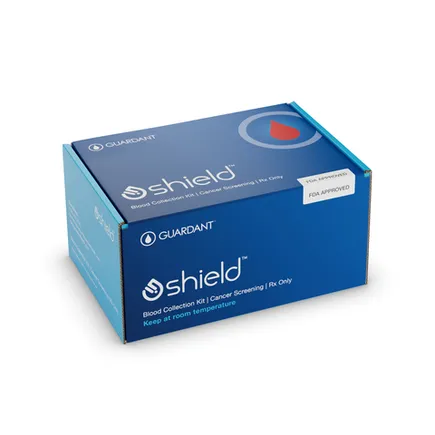Dive Brief:
- The Food and Drug Administration has approved Guardant Health’s Shield blood test as a primary screening option for colorectal cancer in average-risk adults age 45 and older, the company said Monday.
- Guardant is positioning the test, which can be completed during a routine doctor visit, as a more pleasant and convenient alternative to colonoscopy or stool-based tests that will encourage more people to undergo colorectal cancer screening.
- “Shield can address a number of unscreened individuals (with a blood draw) for those not willing or unable to perform a colonoscopy or take a stool test,” Leerink Partners analyst Puneet Souda wrote in a report to clients. Still, Souda expects colonoscopy to remain the first-line screening choice of physicians based on clinical evidence, followed by Exact Sciences’ Cologuard stool test.
Dive Insight:
Guardant’s Shield test detects alterations associated with colorectal cancer by sequencing the cell-free DNA from a patient’s blood sample.
A Food and Drug Administration advisory committee in May backed the test’s approval, saying that the benefits of the screening outweighed the risks in a 7-2 vote. Concerns among panelists focused on test sensitivity in early stages of the disease and the potential for false negative results to deter patients from further testing.
Guardant’s Eclipse study showed the Shield test had colorectal cancer sensitivity of 83.1%, but advanced adenoma sensitivity of only 13.2%. Patients with advanced adenomas have a high risk of developing colorectal cancer.
Analysts noted the test’s labeling will carry precautionary wording.
“The label does include a ‘Precaution’ label directly below the intended use, calling out shortcomings on advanced adenoma (AA) and stage 1 detection,” TD Cowen analyst Dan Brennan said in a report.
Leerink Partners, which pegs the colorectal screening market at $20 billion, expects test demand to continue to be driven by physicians, and hence colonoscopy to remain the standard of care.
“We believe the final label positions [Guardant’s] Shield to target the 50M+ people who remain unscreened,” Souda wrote.
More than three out of four individuals who die from colorectal cancer were not up to date with their screening, Guardant said.
“The persistent gap in colorectal cancer screening rates shows that the existing screening options do not appeal to millions of people,” Daniel Chung, a gastroenterologist and professor at Harvard Medical School, said in a statement from Guardant. “The FDA’s approval of the Shield blood test marks a tremendous leap forward. With increased screening rates and early cancer detection, many more lives can be saved.”

